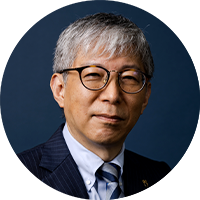Coach's VIEW is a business column authored by executive coaches in COACH A, aimed at providing valuable insights and effective approaches for leveraging coaching to foster organizational and leadership development. The column draws on the latest coaching trends and data, as well as insights from notable global publications on coaching.
Leadership based on Honesty

"I sincerely want to apologize to Mark," George, an executive from a certain manufacturer, forces the words out.
In the past, George lost control of his emotions and unjustly became angry at his subordinate, Mark. Later, realizing he had crossed a line, George desired to apologize. However, he struggled with knowing how to apologize after publicly berating Mark. He had been waiting for the right opportunity to make amends. Unfortunately, since then, Mark stopped greeting George and avoided any interaction. Observing Mark's attitude, George reciprocated by also withdrawing, thinking, "If my subordinate acts that way, I'll do the same." George confesses, "I take pride in being a superior, but I'm genuinely concerned about Mark."
After I asked George, "What do you truly want to accomplish?" during our conversation, the statement mentioned above came directly from him. Afterward, George mustered the courage to apologize to Mark and openly express his feelings. Over time, they began talking and addressing each other, indicating progress in their relationship.
George reflects on his previous reluctance to apologize, attributing it to his pride as a superior. Whenever he encountered Mark, a sense of guilt would surface, causing his confidence in his management abilities to falter. However, by genuinely expressing his feelings, George now feels even more confident.
I Was Envious
Here is another case. John, an executive, began speaking with a wry smile on his face. Among John's colleagues, there is a highly talented individual named Nick. Nick has consistently delivered exceptional results as a leader and has earned the trust of many employees. He has become someone whose accomplishments are not only admired by other executives but also expected by the president. Whenever Nick achieves something noteworthy, John outwardly expresses congratulations with words like, "Congratulations!" However, deep down, John admits that his heart feels unsettled.
On a particular day, while casually sharing a drink with Nick, he locked eyes with John and uttered, "I owe my current self to you, my peer." As John gazed into Nick's earnest face and absorbed his words, a realization struck him like a bolt: "Ah, I've been harboring jealousy towards Nick. It was a vague notion before, but now I genuinely, truly feel envious of his achievements." However, John could not muster the courage to express these emotions to Nick.
"But," John continues, "in an unexpected turn, after confronting my true feelings, I find myself strangely capable of wholeheartedly rejoicing in Nick's success." Presently, John and Nick are collaborating on a new business venture, and John finds their daily interactions enjoyable.
The Impact of Honesty on Relationships with Others
There is research conducted by James M. Kouzes and his colleagues, renowned for their leadership studies, over a span of 25 years, involving over 75,000 individuals (*1). The research focuses on the elements sought in leaders. From a list of 20 items, including qualities such as "visionary," "competent," and "strong-willed," the respondents are asked to choose the characteristics they "most value and want to follow in a leader."
The characteristic that was most chosen in that survey was "honesty." Kouzes points out that the reason for the high appreciation of "honesty" might be because "following a leader whom one doesn't perceive as honest can lead to a loss of self-respect" (*1). I personally expected items such as "visionary," "reliable," "competent," and "supportive" to rank higher, so I was surprised by this result.
The term "honesty" encompasses both the meaning of "no lies or deceit" and the meaning of "being authentic." However, being "authentic," or embracing one's true self, can be challenging for a leader. In general, leaders are expected to embody qualities such as "strength," "confidence," and "competence." As a result, leaders often have preconceived notions of how they should be as leaders and believe they should exhibit certain behaviors as superiors. Additionally, there are expectations from those around them. Certainly, there are many situations where such an approach is necessary for a leader.
However, it is also important to consider that these expectations may make it difficult for leaders to confront their true emotions and be "authentic." This could be a potential barrier preventing leaders from embracing their "authentic" selves.
Navigating the Expectations of Emotions for Leaders
Leaders who hold the belief that they must always display strength often unintentionally dismiss emotions such as "anxiety" and "loneliness" that arise within themselves. This occurs because these emotions are viewed as indicative of vulnerability or weakness. Consequently, even when experiencing such emotions, leaders may suppress or deny their existence, denying themselves the opportunity to acknowledge and genuinely feel them.
Matthias Birk, an adjunct professor at Columbia University, asserts that neglecting to confront one's own emotions not only has detrimental effects on an individual's health and well-being but also impairs relationships with others (*2). Emotions serve as a reflection of our inner state, acting like a mirror. Therefore, avoiding or disregarding emotions can lead to internal distortions and strained relationships.
If we recognize that embracing our genuine emotions has the potential to enhance our connections with others, it may require summoning the courage to set aside our pride and truly listen to our inner voice. It is through this process that we can uncover new relationships, both with colleagues and subordinates, as well as with ourselves.
【REFERENCE】
*1 James M. Kouzes and Barry Z. Posner (Authors), Hisahiro Kanai (Supervisor), "The Leadership Challenge" Kaigetsusha, 2010
*2 Matthias Birk (Author), "Now Is a Great Time to Start Practicing Mindfulness" Harvard Business Review, January 27, 2021
*Regardless of profit, non-profit or intranet, secondary use such as copying, diversion, selling etc. is prohibited without permission.
Language: Japanese

